http://www.theguardian.com/world/2014/mar/16/libya-partition-looms-fight-oil-tanker
( The Guardian has focused on Libya , snippets from their article ..... )
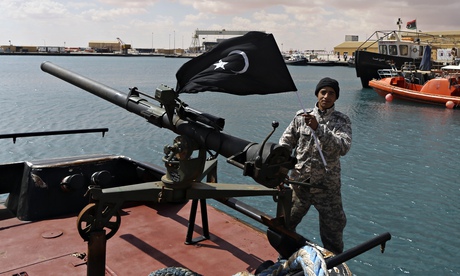
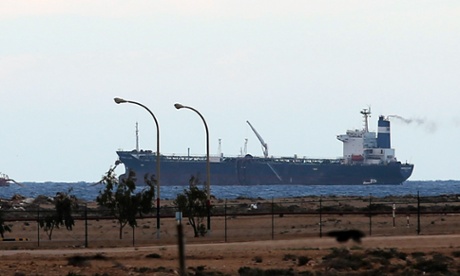 The North Korean-flagged tanker docked at Es Sider. Photograph: Esam Omran Al-Fetori/Reuters
The North Korean-flagged tanker docked at Es Sider. Photograph: Esam Omran Al-Fetori/Reuters
Even Central Bank of Libya Employees subject to kidnappings by armed thugs and / or militias !
and...
Looks like Libya was lying about that oil tanker being shelled and on fire......
A look at declining oil revenues , that mystery tanker , the ongoing blockade and the current caretaker government ......
and......
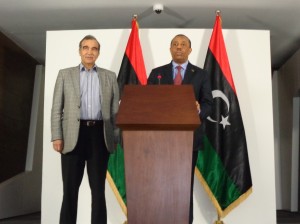
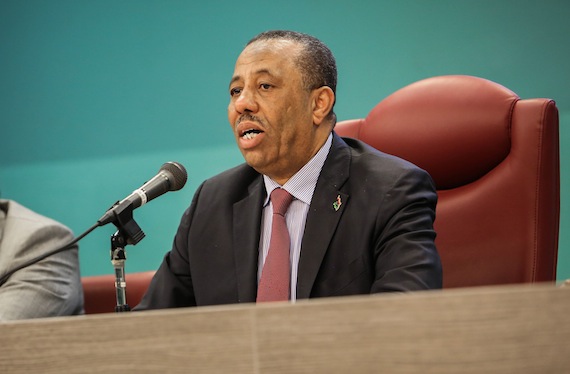
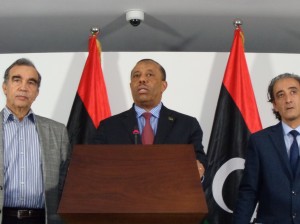
( The Guardian has focused on Libya , snippets from their article ..... )

A rebel under Ibrahim Jathran holds the Cyrenaica flag while standing on a boat at Es Sider port. Photograph: Esam Al-Fetori/Reuters
No one paid much attention to the 21,000-tonne oil tanker Morning Glory as it churned back and forth along the north African coast earlier this month. Tankers are a common sight, carrying Libya's oil exports around the world. But on 1 March it switched off its satellite transponder and vanished from world shipping maps.
Eight days later it appeared at Libya's biggest oil port, Es Sider, blockaded since the summer by a rebel militia. Within a week its arrival would see a prime minister sacked and Libya on the brink of civil war.
**
But the arrival of the Morning Glory was more serious still. Oil and gas account for 95% of government revenues, and most Libyans depend on the state for salaries or handouts. Since the summer, militias in the east and west of the country had blockaded oil ports and fields, demanding more oil cash for the regions and slashing energy production. That had been bad enough. The prospect of the eastern rebels actually selling the oil promised disaster. Normally taciturn and professorial, Zeidan threatened to attack the tanker and sink it if it tried to leave.
***
While Morning Glory was taking on oil, US ambassador Deborah Jones declared that Jathran's actions amounted to "theft from the Libyan people". Last Monday, unperturbed by threats against it, the tanker, loaded with a cargo valued at £20m, slipped her moorings and a new factor entered the equation: the weather.
Howling winds, driving rain and heavy seas met the Morning Glory as she put to sea. Zeidan ordered armed forces to intercept, only to find the cupboard almost bare. Libya's few major warships were upside-down in Tripoli harbour, the result of Nato bombing in the revolution. Its air force was in near mutiny over changes to its command, with three air bases in open revolt, and no bombers took to the air. Instead Zeidan turned to the Libya Shield, a loose alliance of revolutionary militias. A unit in Misrata, 280 miles up the coast, commandeered a tugboat, lashed jeeps mounted with rocket launchers and anti-aircraft guns to the decks, and set sail.
****
Morning Glory: "Don't fire, don't fire. We have security on board we cannot do anything."
Gunboat captain: "We are not firing. Could you change the course to Misrata, please. Have you taken your map to see Misrata port, please?"
 The North Korean-flagged tanker docked at Es Sider. Photograph: Esam Omran Al-Fetori/Reuters
The North Korean-flagged tanker docked at Es Sider. Photograph: Esam Omran Al-Fetori/Reuters
Morning Glory: "I cannot do anything, the security on the bridge, the security on the bridge, with the guns. Security on the bridge with the guns, they cannot let me do anything, please don't fire, please don't fire."
The exchange seemed to validate government claims that gunmen were holding the Morning Glory crew hostage, but the tanker outpaced the tug, which later encountered a patrolling US warship. Jathran had won.
In Tripoli the rebel triumph was the last straw for Congress, which sacked Zeidan, replacing him with former defence minister Abdullah al-Thani. Hours later, prosecutors charged Zeidan with corruption and issued a travel ban. The stage was set for a dramatic escape. At 9pm a private jet landed at Tripoli international airport, the pilot telling the control tower he was picking up diplomats. The plane parked on the VIP apron, but when a passport official turned up to check the passengers he was restrained by security guards while Zeidan got on the plane. It took off and headed for Germany, where Zeidan insisted he was innocent of corruption and denounced his sacking as a "falsification", claiming only 113 members voted to sack him, fewer than the minimum 120 required. He promised to return one day to Libya, but that may be some way off.
*****
Congress, insisting its dismissal was lawful, decided on bold action. Misratan-led Libya Shield units, the most powerful in the country, raced east down the coastal highway to capture the rebel-held ports, running into a unit, not of rebels, but of army special forces at the coastal town of Sirte. In confused fighting five soldiers were killed, four incinerated when their vehicle was hit. Photographs of their badly burned bodies being returning to Cyrenaica spread across social media, inflaming public anger. A mixed force of Jathran's rebels, Cyrenaican militias and army units complete with howitzers was deployed at the Red Wadi, a valley blocking approaches to the ports.
Trouble spread across the country. In the western mountains, next to Tunisia, the Zintan militia, allies of Zeidan, denounced his sacking and mobilised. The Zintan militia is second only to the pro-Congress Misrata militia in strength, and both are more powerful than Libya's tiny regular army. Zintani and Misratan militia units have frequently clashed in Tripoli, vying for control of key bases. Zintan also lies along the gas and oil pipelines carrying oil from western Libya to the coast. In concert with ethnic Berbers to the north and Tobu tribesmen to the south, it has periodically cut pipelines and occupied oilfields. Were it to side with Jathran's forces in the east, it would leave the central government facing an almost total oil blockade, and the prospect of resistance on two fronts.
Adding to the confusion, leaders in the southern province of Fezzan met to consider breaking away from government control, while in Tripoli a militia stormed, looted and burned the HQ of the second infantry brigade. On Thursday, Congress speaker Nuri Abu Sahmain intervened, giving rebels two weeks to vacate the oil terminals in a bid to bring calm. Tribal elders from east and west met, hoping to find a breathing space.
******
"Current conditions seem heavily stacked against a political solution," said Oliver Coleman, an analyst with British risk consultant Maplecroft. "There is an absence of any genuinely unifying figure to act as a bridge between Libya's factions. An Islamist-dominated Congress will find it extremely difficult to reach a negotiated settlement with Jathran, given his renowned animosity to the Muslim Brotherhood."
Jathran's rebels have vowed to hold the Red Wadi, in what some see as a de facto partition of Libya. Among those seeking dialogue is Hassan El Amin, a Misratan former dissident who quit Congress and fled back to Britain in 2012, saying he had had death threats. He is now calling for the UN to mediate. "The west should realise the issue in Libya can get really out of hand, they don't want another Syria. When we were fighting Gaddafi they [the west] came in together. We need them again."
As forces gather either side of the Red Wadi and Libyans prepare for more violence, one question remains unanswered – the fate of the Morning Glory. It was last seen late last week going east along the Egyptian coast, destination unknown. By then it hardly mattered, as news broke that a second tanker was heading for rebel-held ports.
Even Central Bank of Libya Employees subject to kidnappings by armed thugs and / or militias !
Benghazi health official killed
By Noora Ibrahim and Ayman Amzein.
Benghazi, 14 March 2014:
The Head of the Ministry of Health’s Inspection and Following-Up Department for east Libya was murdered in Benghazi last night. Essam Mohamed Salah Al-Owjali, who lived in the city’s Sabri district was shot several times in the chest as he was leaving a local mosque after Isha prayer, according to Benghazi Joint Security Room. He was rushed to Jalaa Hospital but was pronounced dead on arrival.
As usual, the assailants and the reason from his murder are unknown. Political reasons may be involved. However, there have been increasing attacks on officials by criminals whose demands for a commission or a slice of action on deals and projects have been refused. Equally, officials who have been investigating too closely into corruption have come under attack.
Also yesterday, police found the body of a 23-year-old Egyptian in the city’s Orouba sidtrict. Named as Tarek Hassan, he had been both stabbed and shot by his assailants, according to a source at Benghazi Medical Centre. Again, the reason for the killing is unknown.
UPDATE: Derna bank employees found dead after failed LD 6-million heist
By special correspondent.
Derna, 14 March 2014:
The bodies of two employees of the Wahda Bank in Derna were found at a beach thy locals after Friday prayers today. They had been shot in the head.
They had been seized and abducted yesterday in what appears to have been an attempted armed robbery that went wrong.
The two were said to have been transferring LD 6 million of bank funds.
The thieves rammed the vehicle in which the two were travelling, forcing it off the side of the road and down an embankment.
The two employees, who have been named as Saad Al-Mismari and Abdurrazak Badr, tried to flee the scene but were grabbed by their assailants who then drove off with them. The money, however, was left in the vehicle and has since been returned to the bank.
There were strong fears for the safety of the two employees since they knew the identities of the would-be thieves in what has all the markings of an inside job.
There is now talk in Derna of banks going on strike because of the lack of security in the town.
Islamists reported murdered in Derna
By special correspondent.
Derna, 14 March 2014:
Four men, said to be Islamists, were shot dead last night when gunmen attacked a farm house near Derna where they were staying. Two of their colleagues were also seriously wounded in the attack, sources in Derna say. They were taken to the town’s Al-Harish Hospital, where one of them is said to be in a critical condition.
The attack took place in the Fataih area east of Derna.
The four who died have been named as Mohammed Saifaddin Al-Qadi, Ghassan Abubakr Al-Tashani, Abdullah Al-Fakhri and Juma Al-Awami. Two had been shot in the head.
Although Islamists, it has not been disclosed if the victims were members of Ansar Al-Sharia or Salfists or one of the other Islamic groups operating in the area such as the Army of the Islamic State of Libya.
There have been a number of attacks and kiilings of Islamists in the area and earlier this month, an unknown group in Benghazi published a list of Islamists it said it would execute.
Yesterday, in the same Fataih area, four bodies were found, one of them that of a child. All had been shot.
Because of decomposition, the only one to have been identified so far is that of a Syrian who owned a camera shop in the town and who had been missing for more than three days.
According to investigators, the execution-style killings are thought to have occurred in the same place the bodies were found.
The motive for the slayings in unknown. Nor it is known if the two incidents are related.
Slain soldiers taken from Sirte to Benghazi
By Libya Herald staff.
Tripoli, 14 March 2104:
The bodies of four soldiers killed in a missile strike in Sirte on Wednesday morning, were taken to their Benghazi for an autopsy and identification yesterday ahead of burial.
The five, all members of the Zawia Martys Brigade, were killed when a heat-seeking missile hit their vehicle. According to a source at the Benghazi Medical Centre, the five had been burned beyond recognition.
They have been named as Captain Omar Ramadan Al-Manfi, Lieutenant Ibrahim Abdelsalam Mahjoub and three NCOs: Saleh Attargi, Abdel-Aziz Muftah Abdel-Maula Wahishi and Ahmed Bahlouq Aggouri. All were from Benghazi except Captain Al-Manfi who was from Tobruk.
It is not known who fired the missile.
The Benghazi brigade, which is attached to the Saiqa force, was assigned to ensure stability in Sirte in early 2012 but has itself become the target of remaining Qaddafi supporters and others. The town is regarded as the third most dangerous in the country.
Last week five members of a group of suspected Qaddafi loyalists accused to being behind a number of assassinations in the town were arrested.
Ansar Al-Sharia has also become a major power in the town
The latest rebuff to Sirte’s struggle for peace and stability was the arrival last week of Ibrahim Jadhran forces who took over the airbase to the south of the town. They were then were forced out on Tuesday by Misrata’s Libya Shield Central Brigade, deployed there on the orders of the Chief of Staff.
When they arrived, they were said to have mistakenly attacked the Zawia Martyrs Brigade headquarters but then apologised and left.
Meanwhile, according to the Libyan news agency LANA, a source at the Defence Ministry has said there was an explosion last night in a heavy weapons and ammunition depot in Sirte. No one was reported injured.
Kidnapped CBL employees released but banks
still concerned about safety
By Ashraf Abdul Wahab.
Tripoli, 13 March 2014:
Two Central Bank of Libya (CBL) employees kidnapped on Monday were released today amid widespread anger over deteriorating security conditions for bank staff.
The employees, one a clerk and the other a security guard, were kidnapped by gunmen in Tripoli’s Garyan district. They had been transporting foreign currency between CBL branches in the capital.
CBL workers and employees from various commercial banks yesterday protested outside the CBL headquarters about the kidnappings and worsening security for bank staff.
The protesters said unless proper security measures were taken they would be left with no option but to refuse certain duties, such as transporting currency. They demanded that the relevant authorities do more to prevent these incidents and added that the security challenges were having a knock-on effect on customers.
Also on Monday, armed robbers attacked Al-Jomhouriya Bank in south Tripoli’s Swani district. The group opened fire inside the building and managed to steal LD 700 before fleeing the scene.
Last week the kidnapping in Tripoli of three members of staff from Jufra’s Rural (Reefi) Bank prompted the bank’s manager to resign.
Head of Tripoli Local Council Sadat Elbadri said two days ago that kidnappings had become commonplace and were occurring in the capital on a daily basis. He called for a renewed bid to cleanse the capital of armed groups and called for official forces to secure the capital.
and...
Looks like Libya was lying about that oil tanker being shelled and on fire......
A look at declining oil revenues , that mystery tanker , the ongoing blockade and the current caretaker government ......
North Korea severs ties with tanker, ship sails on in murky waters
By Tom Westcott.
Tripoli, 13 March 2014:
The North Korean government has severed all links to the oil tanker Morning Glory that loaded an illegal shipment of oil at Sidra port whilst sailing under the North Korean flag.
The vessel was run by an Egyptian company, according to North Korean news agency KCNA, and was given permission to temporarily use the DPRK flag for six months as part of a contract signed at the end of February.
The loading of an illegal shipment of oil at Sidra port apparently violated this contract and North Korea demanded that the ship leave the port without loading oil, said the spokesman for the North Korean Maritime Administration.
“The DPRK formally notified the Libyan government and the International Maritime Organisation (IMO) that it cancelled and deleted the ship’s DPRK registry and invalidated all the certificates,” he said. The tanker had violated North Korea’s law on the registry of ships, as well as the contract, which prohibited it from transporting contraband cargo, the spokesman said.
The ship now had nothing to do with North Korea, he added.
The revelation that an Egyptian company was involved with Morning Glory adds a further twist in the mystery of who is behind the illegal oil purchase.
The Director of the Alexandria-based company told the Libya Herald that it was neither the ship’s operators nor managers, and dealt solely with paperwork relating to certificates and expiry dates.
“Our company does not own the tanker, nor is our company an agent for it nor an operator thereof. Our company never gets involved in any way in the cargo management or the determining of ports or destination of the said tanker,” the company said in a statement.
“We are not managers for the ship so we don’t get any notifications from it and we do not have permission to ask it leave or enter any ports. This is the responsibility of the owner and operators,” he said. “We are not able to know or control its contracts or deals.”
The manager said he could not give any details about who owned or operated the ship because it had dealt with the Morning Glory company solely through emails.
Both the General National Congress (GNC) and the National Oil Company (NOC) previously said the boat was owned by a Saudi Arabian businessman. Shipping sources, however, told the Libya Herald that a company based in the UAE was behind the deal.
The Morning Glory sails on, through the murky waters of who struck the deal with Ibrahim Jadhran to buy the oil. Now stripped of its rights to sail under for flag of North Korea, it may now be facing another legal challenge, as international maritime law requires every merchant ship to be registered in a country.
The last reported sighting of the vessel was yesterday off the coast of Egypt near the town of Mersa Matruh, according to Culture Minister Habib Al-Amin.
and......
Oil tanker now off Egyptian coast says Culture Minister
By Libya Herald staff.
Tripoli, 12 March 2014:
The oil tanker that loaded a shipment of illegal crude at Sidra has been spotted off the coast of Egypt after escaping from the Libyan Navy.
Culture Minister Habib Al-Amin said that the ship managed to evade Navy vessels stationed off the coast of Sidra during bad weather, according to Libyan news agency LANA. It was escorted into international waters by four tug boats, he said.
He confirmed that the Navy shot the tanker, Morning Glory, resulting in a fire on board, but said it did not open fire again, following a request from a US vessel in the area. There were concerns, he said, that if hit again, the tanker might explode and cause an environmental disaster.
The US embassy in Tripoli today said it had no comment “on rumours”.
Amin said the Navy thought the Captain would stop Morning Glory after the fire broke out. However, this was quickly brought under control and the tanker continued sailing.
The vessel had been spotted today off the coast of Egypt near the town of Mersa Matruh, Amin said. He added that the government had asked the Egyptian authorities to help ensure the tanker was returned to Libya.
There are now reports that another oil tanker, sailing under the flag of Venezuela, is moored off the coast of Libya. A source close to Ibrahim Jadhran, who has controlled three eastern oil ports since August last year, confirmed to the Libya Herald that the vessel was expected to dock at Sidra port.
Minister of Transport resigns
Tripoli, 13 March 2014:
The Minister of Transport, Abdel-Qader Mohamed Ahmed, resigned today, just two days after former Prime Minister Ali Zeidan was ousted by a vote of no-confidence.
Ahmed handed his resignation to ‘caretaker’ Prime Minister Abdullah Al-Thinni today. Reasons behind the resignation have not yet been given, according to Libyan news agency LANA.
GNC gives Jadhran two weeks to hand over oil terminals
By Ashraf Abdul Wahab.
Tripoli, 13 March 2014:
The General National Congress (GNC) has given federalist forces two weeks to hand over oil export terminals in the east before they are taken by force.
GNC head Nuri Abu Sahmain said yesterday that, at the end of the fortnight, military forces from across Libya would unite and move against armed groups operating under the control of Ibrahim Jadran.
The announcement built on decision No. 42 of 2014 made early in the current oil tanker crisis. The decision authorised the setting up of an armed force for the purpose of returning oil ports at Sidra, Ras Lanuf and Zueitina to state control.
Abu Sahmain said the deadline was a final bid to avoid confrontation, and “a means of giving a chance to all parties to make efforts to end the blockade”. He said he had met with Congress members from eastern regions before setting the two-week deadline.
The embargo of oil ports in the east had lasted for eight months, he said, robbing the Libyan people of much-needed oil revenues. He added that this had left the country on the verge of bankruptcy.
Armed groups supporting Ibrahim Jadhran were forced from Sirte’s Ghardabiya airbase and out of the town’s Bu Hadi district two days ago, after being attacked by troops from Misrata.
On Tuesday, there were reports that these Misratan forces, along with units from other regions of the country, were on standby to head east and reclaim the ports.
US$ 8 bn loss of oil revenues in second half of 2013 – Acting Oil Minister Shakmak
By Sami Zaptia.

Acting Oil Minister Omar Shakmak along side caretaker Prime Minister Abdullah Thinni at yesterday’s press conference. (Photo: Sami Zaptia).
Tripoli, 13 March 2014:
Omar Shakmak, acting Minister of Oil, said that the embargo of the oil terminals in eastern Libya had had a “serious negative impact” on national revenues and the budget.
Speaking briefly alongside the newly installed caretaker Prime Minister Abdullah Thinni at yesterday’s press conference, Shakmak said that in the second half of 2013 revenues had declined by more than US$ 8 bn, or approximately LD 11-12 bn.
This deficit, he said, continued in the first quarter of 2014 with revenues only 16 percent of those budgeted for.
With regards to the illegal entry of the North Korean flagged oil tanker Morning Glory, the acting Minister said that the Sidra Port is one of the ports declared under a state of force majeure which he said meant that legally there could be no exports through it.
Shakmak said that the NOC was the only entity in Libya legally entitled to export oil and that the NOC had notified all parties locally and internationally of this illegal export of Libyan oil.
Libya’s eastern oil terminals have been embargoed by federalists for over eight months, and protracted negotiations have failed to lift the embargo.
Yesterday, GNC head Nuri Abusahmain announced that a final two weeks of negotiations will be permitted before military force will be used to end the costly embargo.
Attorney General denies requesting Interpol red notice for Zeidan
Tripoli, 13 March 2014:
The Attorney General has denied issuing a red notice to Interpol for the arrest of former Prime Minister Ali Zeidan.
Head of the investigation department of the Attorney General office, Sadiq Al-Sour, told Libyan news agency LANA that media reports about the Interpol notice were completely untrue.
He said the only action taken by the Attorney General was to put Zeidan under a travel ban pending investigations into alleged financial irregularities.
Zeidan left the country on Tuesday after the General National Congress (GNC) passed a vote of no-confidence against him.
Former Prime Minister Ali Zeidan did not run away from Libya – Thinni
By Sami Zaptia.

Abdullah Thinni during a recent visit to Italy to assess members of the Libyan National Army undergoing training at Cassino, 130 km south-east of Rome.
(Photo: WAC/Stuart Price)
(Photo: WAC/Stuart Price)
Tripoli, 12 March 2014:
Asked by the media at today’s inaugural press conference for caretaker Prime Minister Abdullah Thinni why was it that his predecessor had run away to Europe in view of a travel ban issued against him, Thinni said that in his view he had not run away.
Thinni said that it was perfectly legitimate and within former Prime Minister Ali Zeidan’s right to travel, as guaranteed by Libya’s Transitional Constitutional Declaration.
The caretaker Prime Minister said that if former Premier Ali Zeidan had left the country and if there was an arrest warrant against him, he could always return to Libya.
Former Prime Minister Ali Zeidan had been reported as having left Libya last night after the GNC had voted him out of office.
His departure was interpreted by some as hasty and seen as having flouted a travel ban imposed by the Attorney General Abdel Qadar Radwan. The travel ban, directed to the head of the Passports Agency, was issued last night. It said Zeidan was to be prevented from leaving the country until ongoing investigations into financial irregularities had been completed.
The investigations cited by the Attorney General as prompting the travel ban appear to relate to allegations that money was offered to armed groups controlling three oil export terminals in the east of the country to end their blockades.
Ibrahim Jadhran, the self-styled leader of the federalists occupying the ports, accused GNC Energy Committee head Naji Mukhtar and the government of trying to bribe him with LD 30 million to end the blockade in September last year.
Zeidan denied any involvement but Mukhtar admitted giving a number of cheques to one of Jadhran’s brothers Salem. He said that these could not be considered bribery because the accounts held insufficient funds for them to be honoured. One cheque for LD2.5 million was, however, reportedly cashed.
I consider my government a caretaker government – Thinni
By Sami Zaptia.

Caretaker Prime Minister Abdullah Thinni said he considered his government as a caretaker government at his first press conference today (Photo: Sami Zaptia).
Tripoli, 12 March 2014:
At his first press conference after taking over from Ali Zeidan, Abdullah Thinni confirmed that he considers his government as purely a “caretaker government” until the GNC appoints a new Prime Minister at the end of his two weeks tenure.
Abdullah Thinni, flanked by the acting Minister for Oil and the Minister of Culture, assured citizens that the democratic change of government in a peaceful manner is a natural process in the new Libyan democratic order. He called on all to put the supreme interests of the nation above all and work seriously for the building of Libya.
Thinni also confirmed that his government considers the decisions taken by the GNC as constitutional and that it will abide by them.
The caretaker Prime Minister did not elaborate as to what exactly he was referring to, leading to speculation that he was referring to the claims by some GNC members that the process of the removal of Ali Zeidan as Prime Minister was carried out incorrectly and was therefore unconstitutional.
Equally, the caretaker Prime Minister could be referring to the fact that a constitutional amendment to the Transitional Constitutional Declaration to organize parliamentary elections in June was bundled and passed by the GNC as part of the same vote of no confidence in Ali Zeidan.
The caretaker Prime Minister went on to request that the GNC pass an urgent emergency budget in order that his government can continue the work of governing and in order to “face the great security challenges”.
No comments:
Post a Comment